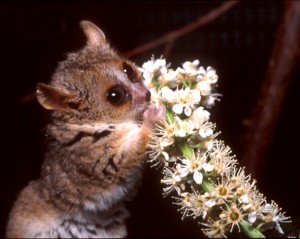Students and researchers come from around the world to study the living and fossil collections at the Duke Lemur Center. The more we learn about these critically endangered animals, the better we are able to protect them in the wild, and care for them in captivity.

Researchers at the Duke Lemur Center are working to ensure that lemurs stay healthy as environmental conditions in their island home continue to shift.
One group of researchers is studying what shifting temperatures and rainfall patterns in Madagascar could mean for lemur health by taking a cue from the parasites they carry. By combining parasite data from ongoing surveys of lemur health in the wild with climate projections for Madagascar as a whole, the researchers hope to predict where disease hotspots are likely to occur, and prepare for them before they hit.
Because they are a closer genetic match to humans than mice or rats are, researchers at the Duke Lemur Center hope that non-invasive research on these tiny primate cousins will help humans too. To that end, they are focusing on a group of lemurs that develop plaques in the brain as they age similar to those see in human Alzheimer’s patients.

Non-invasive research on the grey mouse lemur could lead to a better understanding of the aging brain.
In a collaboration between the Duke Lemur Center and the Duke Center for In Vivo Microscopy, researchers are using noninvasive neural imaging to monitor these and other age-related signs of neural degeneration as lemurs grow to old age, and very importantly, to do so without harm to the animals.
Related News
DLC’s new lemurs could aid Alzheimer’s research
Aug 29, 2013
Duke Chronicle
Meet Filbert (or why some of the world’s tiniest primates could help us understand the aging brain)
Aug 13, 2013
Duke University Research News
Lemur parasites may expand across Madagascar thanks to climate change
Jan 25, 2013
RedOrbit
Will lemurs survive parasites gone wild?
Jan 24, 2013
Futurity
Parasites of Madagascar’s lemurs expanding with climate change
Jan 23, 2013
Duke Today
Parasites of Madagascar’s lemurs expanding with climate change
Jan 23, 2013
Duke News
Parasites of Madagascar’s lemurs expanding with climate change
Jan 23, 2013
National Science Foundation News
Related Publications
Barrett, M., et al. (2013). “Climate change, predictive modeling and lemur health: Assessing impacts of changing climate on health and conservation in Madagascar.” Biological Conservation 157: 409-422.

